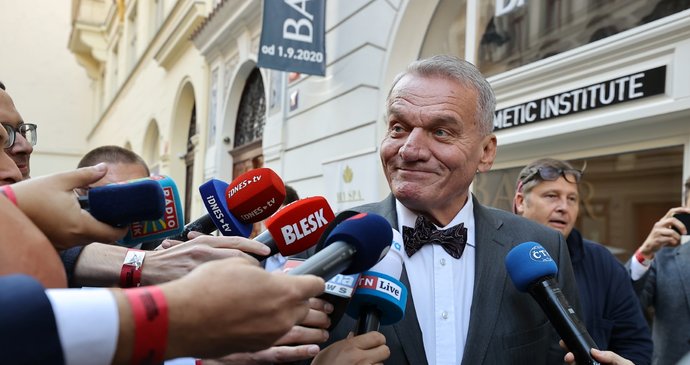Prague police officers from the homicide department illegally obtained statements from phones, according to the court it was not a criminal act | iRADIO
A pair of police officers from Prague obtained information about phones directly from a Vodafone employee during the investigation of the murders, while in at least three cases they did not have the permission of the court. In the end, the case ended with disciplinary punishment, because the police did everything to uncover the murderer, not for personal gain.
Share on Facebook
Share on LinkedIn
Print
Copy the url address
Abbreviated address
Close
A pair of police officers from Prague secured information about phones directly from a Vodafone employee during the murder investigation (illustrative photo) | Photo: Michaela Danelová | Source: Czech Radio
When captain Pražák v TV series Cases 1st Department he complained about the tediousness of finding phone records, he spoke to his real colleagues from the heart. They obtained statements from several phones between 2014 and 2016 without having the necessary permission.
Mobile tracking remains – for police and marketing. What about your phone or email?
Read the article
According to the General Inspectorate of the Security Forces, it was a serious matter, the information from the telephone history is extremely sensitive. In addition to a list of who a person called and texted, the records also contain information about where they moved, up to half a year back. So if the police want to work with them, they need the consent of the public prosecutor and the court. But it takes time.
As he explained to a witness and a police officer before the court, time plays a crucial role in solving a murder, and information from the phones of the victims and the possible perpetrator can help the police.
“The police officer prepares a comprehensive and comprehensible motion, which must be studied by the supervising public prosecutor and submitted to the relevant court for an order. The order from the court then goes to the Special Activities Unit, which will contact the relevant operator. The operator is only dealing with the order according to his time possibilities,” the policeman described, adding that the whole process can take several days, “which can be fatal for the investigation of the most serious crimes.”
You can read the full court decision here:
The pair of police officers – one of whom he indicted the public prosecutor, the other who was immediately handed over for disciplinary punishment – therefore turned directly to one of the employees of Vodafone, who passed on the information to them.
On the edge, but worth it
He stated in court that he “knew that it shouldn’t be done that way, that it is not completely in accordance with the regulations”, but in view of the seriousness of the situation, which the police officer “explained to him very suggestively”, some information was sent to the policeman on his private e-mail – email at the Seznam company.
Similarly, according to the court, the accused police officer defended himself, saying that “he knows it was on the edge, but the police often move on the edge and are aware of the risk, but finding and apprehending the perpetrator is worth it.”
Were you near the crime scene? Your record will remain in the police database for five years, the officers admit
Read the article
In one case, it was also an investigation into the case of the murders of taxi drivers, which was followed by the media. There, the police obtained transcripts of the calls of the owner of a taxi company, for whom two of the murdered drivers worked.
“The investigation proved that in five cases the worker, upon urgent request to the Police of the Czech Republic, gave information for the investigation of the murder directly to the requesting police officer. In turn, we have taken measures so that, regardless of the seriousness of the criminal activity under investigation, the requested data will only be released after the previous official request of the requesting authority,” Vodafone spokesperson Ondřej Luštinec wrote to iROZHLAS.cz.
The company also strengthened logging, i.e. activity recording, in the affected IT systems and reviewed the security of the department that takes care of the transfer of data to the police.
Luštinec emphasized that the worker gave the information to the police in good faith and after being assured that he would get the necessary permits later. He sent the data from his work e-mail, i.e. transparently. And where it was possible, he himself verified from public sources that the murders really took place.
Good cop
According to the General Inspectorate of Security Forces, both police officers and one civilian were eventually prosecuted. “Nevertheless, the public prosecutor at (the first – note Red.) of the police officer decided that he would be dealt with disciplinary action by his service functionary, and he completely stopped criminal prosecution of the civilian person,” wrote editorial spokeswoman Ivana Nguyenová.
Dragging information from mobile phones. Will governments lose out on blanket surveillance of caller and internet user data?
Read the article
District Court for Prague 5 subsequently the case he advanced back the police, saying that it was not a criminal offense but a disciplinary offence. According to the court, although the accused police officer acted illegally, he was “obviously driven by selfless and humanly understandable motives, which in many other ways made her a good police officer.”
Therefore, according to the court, his actions were not criminal because his actions did not reach “the necessary level of social harm from the point of view of the lower limit of criminal responsibility”.
“Individual misconduct”
The public prosecutor filed a complaint against the decision, but the Municipal Court in Prague confirmed the original verdict.
The regional police headquarters did not comment on the case and referred the question to the Police Bureau. According to spokesman Ondřej Moravčík, the police do not register any similar cases and “it was at most an individual error, not a system failure”.
According to spokesperson Nguyen, the inspection of the security forces does not keep detailed statistics that would distinguish cases where a police officer obtained statements from mobile phones without authorization.
From the past, there is a media-known case of a policeman who followed in such a way the President of the Constitutional Court Pavel Rychetský and some close associates of the then President Václav Klaus.
Share on Facebook
Share on LinkedIn
Print
Copy the url address
Abbreviated address
Close



